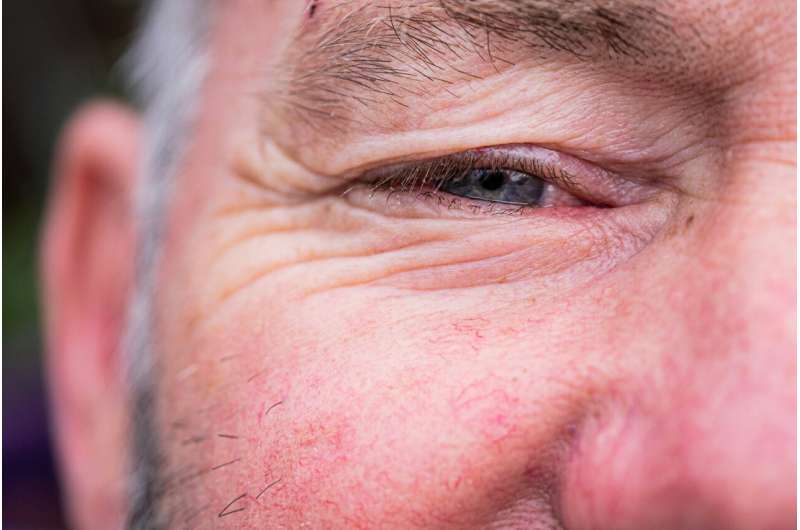This article has been reviewed according to Science X's editorial process and policies. Editors have highlighted the following attributes while ensuring the content's credibility:
fact-checked
reputable news agency
proofread
Little-known devices restore vision to people who can't be helped by regular glasses

Dick Bramer, 76, likes to watch birds flock outside the window of his home in Scandia. But for two years he couldn't see them well enough to identify the various species.
In July 2021 Bramer suffered what doctors diagnosed as an ocular stroke (they said a small particle of plaque must have blocked blood flow to the optic nerve) in one eye. He already had lost vision in his other eye decades earlier, due to what doctors said was a swollen optic nerve.
After the stroke, everything was blurry. The Bramers looked everywhere for something that might help. They went to stores catering to low-vision consumers, but found that most of the products were aids to help people function better without their vision, not improve its clarity. Because they spend winters in Florida, they figured some of the other retirees must have heard of a solution. Nope.
Then a friend happened to tell them about Low Vision Restoration in Blaine, Minnesota. Optometrist Chris Palmer, who founded the clinic, prescribes devices that can help improve people's vision when other glasses can't. Palmer fitted Bramer with the devices, which are like miniature binoculars or telescopes affixed to regular glasses.
Bramer tried them out and suddenly saw his wife clearly for the first time since the stroke.
The devices, called bioptic telescopic glasses, can help patients resume reading, recognizing faces across a room, watching TV, playing cards, in some cases even driving, Palmer said. But for reasons nobody seems to be able to explain, few people have heard of them.
"They tend not to be widely utilized, unfortunately," said Coon Rapids ophthalmologist Scott Peterson, who does refer patients to Palmer. "Some people don't know that practitioners like Dr. Palmer exist, or they have a hard time finding them."
Palmer said eye doctors "aren't doing a great job" of referring patients who might benefit from them. He's not sure why.
"Almost every patient that we talk to has the same questions: 'Why didn't my doctor tell me?' 'Why haven't I heard of this before?'" he said. "I would say that if you asked a hundred doctors you'd get a hundred different types of answers as to why they do or don't tell people."
Telescopic glasses are "basically binoculars" that affix to glasses and magnify images so that objects look bigger, closer and clearer, said Palmer, who has specialized in this area since 2008. They resemble jewelers' loupes.
"It's like having a miniaturized telescope or binocular stuck right into a pair of glasses," Palmer said. "They're two individual eyepieces that you're looking through." Their positioning can be adjusted as needed.
Bioptic telescopes are helpful for people with eye conditions—including macular degeneration, ocular albinism, Stargardt disease, glaucoma, diabetic retinopathy and rod cone dystrophy—that can reduce vision to levels too low to benefit from regular glasses and contacts.
The devices won't help everybody with eye problems, Peterson noted, "but in many cases people can regain some level of independence, reading, the ability to perform tasks around the home," he said.
Another reason they're not more widely used is that they're expensive and generally not covered by insurance, Palmer said. Then again, hearing aids—an analogous product in many ways—can be expensive and often aren't covered, either, but most people know about them.
Minnesota's State Services for the Blind's vocational rehabilitation program offers bioptic telescopes among a number of devices it provides to help people with low vision (along with closed-circuit TVs, magnification apps and software, specialized eyeglasses, etc.), said Director Natasha Jerde.
The program occasionally provides the devices for free, among other vision products, Jerde said. But because it's a work program, the items must be needed as part of a plan to get or keep a job or advance in a career.
2024 StarTribune. Distributed by Tribune Content Agency, LLC.





















